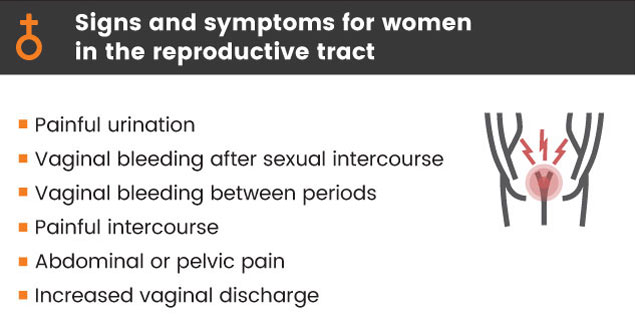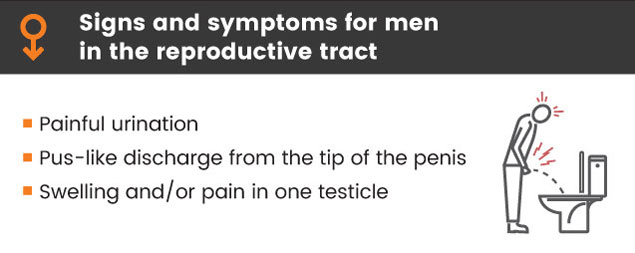Gonorrhea
What is gonorrhea? Gonorrhea, colloquially known as the clap, is a sexually transmitted infection caused by the bacterium Neisseria gonorrhoeae. Infection may involve the genitals, mouth, or rectum. Gonorrhea is a sexually transmitted disease (STD) that can infect both men and women. It can cause infections in the genitals, rectum, and throat. It is a very common infection, especially among young people ages 15-24 years. Anyone who is sexually active can get gonorrhea. Gonorrhea can cause very serious complications when not treated, but can be cured with the right medication. So, you (or your partner) have gonorrhea. The good news is, this common sexually transmitted disease (STD) is easily treated. And you'll want to get treated as soon as possible. If you don't, gonorrhea can cause a number of long-term health problems for both women and men.

According to the Centers for Disease Control and Prevention, approximately 900,000 new cases of gonorrhea occur each year in the United States, with 600,000 of the cases being in young people ages 15 to 25. Worldwide, the World Health Organization estimates that there are currently 80 million people infected. In a recent release from the WHO, gonorrhea is becoming more and more difficult to treat. In fact, three new superbug strains have been identified that cannot be killed by antibiotics currently on the market.
How is gonorrhea spread?
You can get gonorrhea by having vaginal, anal, or oral sex with someone who has gonorrhea. A pregnant woman with gonorrhea can give the infection to her baby during childbirth.
How do I know if I have gonorrhea?
Researchers indicate that if gonorrhea symptoms are going to appear, they will develop within the first 10 to 14 days after exposure. Some men with gonorrhea may have no symptoms at all. However, men who do have symptoms, may have:
- A burning sensation when urinating
- A white, yellow, or green discharge from the penis
- Painful or swollen testicles (although this is less common)
Most women with gonorrhea do not have any symptoms. Even when a woman has symptoms, they are often mild and can be mistaken for a bladder or vaginal infection. Women with gonorrhea are at risk of developing serious complications from the infection, even if they don't have any symptoms.
Symptoms in women can include:
- Painful or burning sensation when urinating
- Increased vaginal discharge
- Vaginal bleeding between periods

Rectal infections may either cause no symptoms or cause symptoms in both men and women that may include:
- Discharge
- Anal itching
- Soreness
- Bleeding
- Painful bowel movements

Sensitivity to light, eye pain, and discharge from the eyes is common. This is also the most universal sign to appear for newborns. A sore throat and swollen lymph nodes in the neck are common. Itching, pus-like discharge, blood, and straining during a bowel movement are common for both sexes if gonorrhea is present in the rectum. Often overlooked, gonorrhea can infect joints. This condition is called septic arthritis. Joints can become warm, swollen and extremely painful.
You should be examined by your doctor if you notice any of these symptoms or if your partner has an STD or symptoms of an STD, such as an unusual sore, a smelly discharge, burning when urinating, or bleeding between periods.
How to diagnose a gonorrhea infection?
To diagnose a gonorrhea infection, the most common procedure is a gram stain screening where a sample of tissue or discharge is examined under a microscope. While it is definitely the fastest option, it is not always accurate. In fact, while it can detect Neisseria gonorrhoeae bacterium, in men that are asymptomatic, it may not detect this STD. The most accurate testing is a DNA test called the nucleic acid amplification test, or NAAT. If you are concerned about gonorrhea, ask your healthcare provider for this test. Once diagnosed, conventional treatments focus on killing the infection with antibiotics.
Pregnancy. How does gonorrhea affect my baby?
If you are pregnant and have gonorrhea, you can give the infection to your baby during delivery. This can cause serious health problems for your baby. If you are pregnant, it is important that you talk to your health care provider so that you get the correct examination, testing, and treatment, as necessary. Treating gonorrhea as soon as possible will make health complications for your baby less likely.
Gonorrhea Treatment
Gonorrhea can be cured with the right treatment. It is important that you take all of the medication your doctor prescribes to cure your infection. Medication for gonorrhea should not be shared with anyone. Although medication will stop the infection, it will not undo any permanent damage caused by the disease.
If you have this STD, your doctor will likely prescribe antibiotics: Azithromycin (Zithromax, Zmax, Z-Pak, Sumamed). This antibiotics are taken by mouth. One dose of azithromycin may be enough. If the infection is severe, you might need to take antibiotics for a week or more. Your doctor will likely closely monitor your health during this time.
What happens if I don't get treated?
Untreated gonorrhea can cause serious and permanent health problems in both women and men.
In women, untreated gonorrhea can cause pelvic inflammatory disease (PID). Some of the complications of PID are:
- Formation of scar tissue that blocks fallopian tubesexternal icon
- Ectopic pregnancy (pregnancy outside the wombexternal icon)
- Infertility (inability to get pregnant)
- Long-term pelvic/abdominal pain
In men, gonorrhea can cause a painful condition in the tubes attached to the testicles. In rare cases, this may cause a man to be sterile, or prevent him from being able to father a child. Rarely, untreated gonorrhea can also spread to your blood or joints. This condition can be life-threatening. Untreated gonorrhea may also increase your chances of getting or giving HIV – the virus that causes AIDS.
Complications can occur if gonorrhea is not treated, some which are dangerous and even life-threatening. Infertility in both men and women, pelvic inflammatory disease, and epididymitis are possible complications if left untreated. If Neisseria gonorrhoeae spreads through the bloodstream, which it can, gonorrhea can infect other parts of the body including your joints, leading to septic arthritis. Watch for severe joint pain, stiffness, swelling, as well as a fever and mention any of these symptoms to your healthcare provider. Men who have had gonorrhea are associated with an increased risk of developing prostate cancer. When an infant is born with gonorrhea, possible complications include blindness, infections, and sores on the scalp. If you are pregnant and have had gonorrhea in the past, be sure to mention it to your OB-GYN team.
Antibiotic-Resistant Gonorrhea
It is becoming harder to treat some gonorrhea, as drug-resistant strains of gonorrhea are increasing. If your symptoms continue for more than a few days after receiving treatment, you should return to a health care provider to be checked again. You and your partner should wait at least 7 days after you both finish treatment to resume sexual activity. Your doctor may advise you to follow up for testing to make sure the infection is completely gone. Unfortunately, some types of gonorrhea bacteria don't respond to the usual antibiotic treatment. Doctors call this antibiotic resistance. They've been seeing a rise in these stronger bacteria for several years. If you continue to have symptoms a few days after treatment, see your doctor again. He may prescribe a longer course of different antibiotics.
Gonorrhea has progressively developed resistance to the antibiotic drugs prescribed to treat it. Following the spread of gonococcal fluoroquinolone resistance, the cephalosporin antibiotics have been the foundation of recommended treatment for gonorrhea. The emergence of cephalosporin-resistant gonorrhea would significantly complicate the ability of providers to treat gonorrhea successfully, since we have few antibiotic options left that are simple, well-studied, well-tolerated and highly effective. It is critical to continuously monitor antibiotic resistance in Neisseria gonorrhoeae and encourage research and development of new treatment regimens.
When can I have sex again after gonorrhea treatment?

You should wait seven days after finishing all medications before having sex. To avoid getting infected with gonorrhea again or spreading gonorrhea to your partner, you and your sex partner should avoid having sex until you have each completed treatment. If you've had gonorrhea and took medicine in the past, you can still get infected again if you have unprotected sex with a person who has gonorrhea.
The bottom line
As bacteria continue to morph and become more and more resistant to conventional antibiotics, emerging research is underway to look into new antimicrobial agents. If you are sexually active, have an honest and open talk with your health care provider and ask whether you should be tested for gonorrhea or other STDs. If you are a sexually active man who is gay, bisexual, or who has sex with men, you should be tested for gonorrhea every year. If you are a sexually active woman younger than 25 years or an older woman with risk factors such as new or multiple sex partners, or a sex partner who has a sexually transmitted infection, you should be tested for gonorrhea every year. Gonorrhea is a curable STD, although new strains of the bacteria that cause it are emerging, showing signs they are becoming resistant to antibiotics. Researchers are concerned that with the continued evolution of the bacteria, and the global nature of gonorrhea, it is likely that gonorrhea will worsen and the potentially severe complications will become a silent epidemic.
